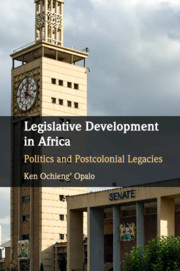Book contents
- Frontmatter
- Dedication
- Contents
- List of Figures
- List of Tables
- Preface
- Acknowledgements
- 1 Introduction
- 2 Legislative Development in Africa
- 3 Intra-Elite Politics and Credible Commitment
- 4 Colonial Origins of Parliaments in Kenya and Zambia
- 5 Elite Control and Legislative Development
- 6 Legislative Institutionalization in Time
- 7 Electoral Politics and Legislative Independence
- 8 Conclusion
- References
- Index
3 - Intra-Elite Politics and Credible Commitment
Published online by Cambridge University Press: 17 June 2019
- Frontmatter
- Dedication
- Contents
- List of Figures
- List of Tables
- Preface
- Acknowledgements
- 1 Introduction
- 2 Legislative Development in Africa
- 3 Intra-Elite Politics and Credible Commitment
- 4 Colonial Origins of Parliaments in Kenya and Zambia
- 5 Elite Control and Legislative Development
- 6 Legislative Institutionalization in Time
- 7 Electoral Politics and Legislative Independence
- 8 Conclusion
- References
- Index
Summary
This chapter provides a theoretical model of postcolonial legislative development under preponderant chief executives. The model outlines a two-way commitment problem between powerful chief executives and elites acting collectively in legislatures. By lowering the costs of intra-elite collective action, legislatures serve as a means of credible commitment from chief executives not to abrogate intra-elite arrangements to share power and governance rents. This outcome checks executive tyranny. However, the establishment of legislatures that lower the costs of intra-elite collective action against chief executives increases the risk of legislative tyranny. Through their legislative monopoly on lawmaking, elites can simply legislate away executive powers, thereby abrogating intra-elite arrangements. For this reason, chief executives’ willingness to tolerate legislative strength and independence is conditional on their ability to effectively balance legislators acting collectively. In this manner, presidential strength conditions the upper limit of legislative strength and independence – with strong presidents likely to govern with stronger and organizationally independent legislatures. This simple model explains legislative development under both autocracy and democracy as well as the observed empirical regularity of a positive correlation between institutionalized autocracy and regime duration. Strong chief executives, who are likely to have long tenures, are also more likely to institutionalize their rule.
- Type
- Chapter
- Information
- Legislative Development in AfricaPolitics and Postcolonial Legacies, pp. 72 - 98Publisher: Cambridge University PressPrint publication year: 2019



